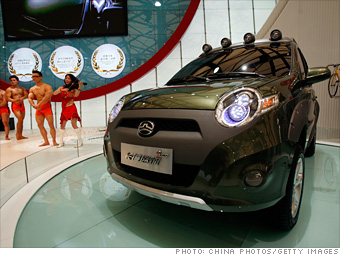
Dancers perform beside a Great Wall car in Shanghai.
Morgan Stanley calls this its worst-case scenario for the auto industry. Developed markets become locked into a cycle of austerity and slow growth. Cars are viewed as commodities, and technology is less important. Cheap cars from emerging markets spread like a computer virus, driving down prices and squeezing legacy companies into niche status or out of business. More successful are low-cost producers with high volumes. Traffic congestion and environmental concerns limit auto ownership. Price and the need for reliable transportation become more important than fuel economy or style. The middle class shifts its focus to entry-level cars, destroying the customer base for high-end manufacturers. "This truly a dark era for the auto industry," say the authors.
Winners: Great Wall takes the prize here -- even though it is only China's tenth-largest producer -- with Tata in hot pursuit. Among established manufacturers, only VW, Hyundai, and Kia make the top tier. GM outpoints Ford again because of its success in China.
Losers: Mercedes-Benz can hardly prosper in such an environment, so Daimler finishes well down the list. With the help of Nissan, Renault outpoints Peugeot-Citroen and Fiat (Chrysler doesn't get a mention) in this and all other scenarios. And Tesla ranks dead last since the combination of low fuel prices and bare bones products hardly plays well with its rocket-science image.
NEXT